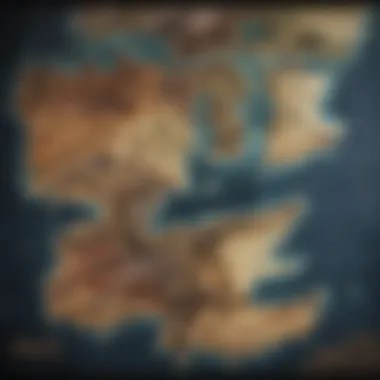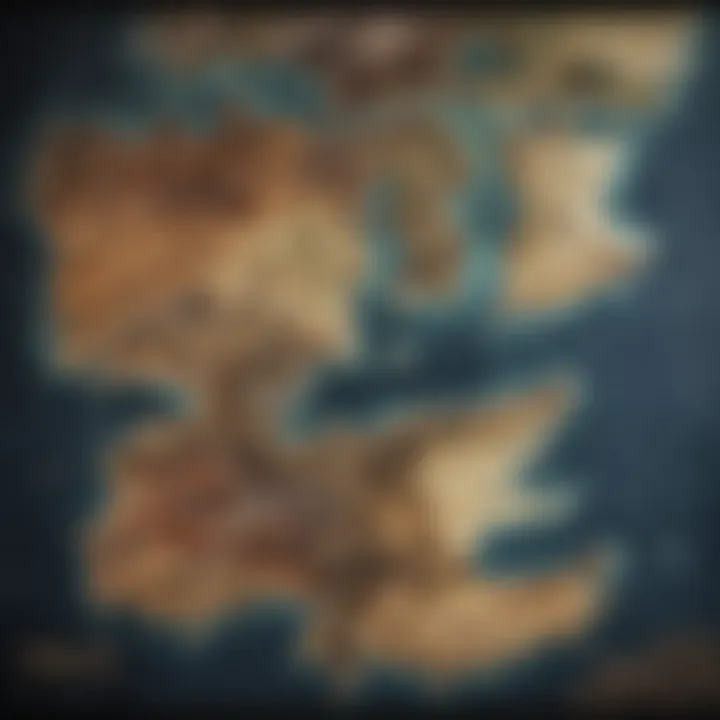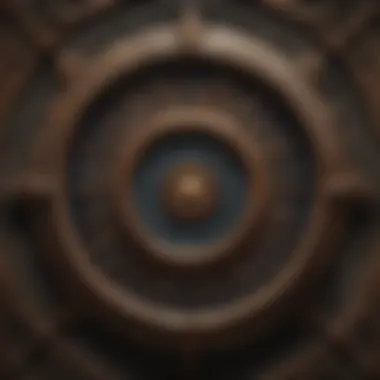Exploring the Connection Between Martin's Novels and Game of Thrones


Intro
The intricate world crafted by George R.R. Martin is not just a simple tale of swords and sorcery. It’s a sprawling saga woven with threads of human ambition, treachery, and rigorous moral ambiguity. With each character playing a vital role in the narrative, understanding their arcs becomes pivotal in grasping the overall impact of both the novels and the television adaptation, Game of Thrones. This exploration reveals how these multifaceted personas not only drive the plot but also symbolize broader themes that resonate throughout the ages.
In this article, we’ll delve into the character dissections, episode breakdowns, lore explorations, and fan theories surrounding these compelling narratives. By piecing together these elements, readers will appreciate the deeper connections between the original literary works and their screen counterparts. Our journey will be one of discovery, as we navigate the meaningful intersections of text and television.
Character Dissections
Detailed Analysis of Key Characters
Game of Thrones introduced us to an extraordinary cast. From the strategic cunning of Tyrion Lannister to the indomitable spirit of Daenerys Targaryen, each character delivers a unique perspective, painting a picture of a world vying for power. The depth of these personalities echoes Martin's literary style, where characters are never simply good or evil; they often embody shades of gray.
Take Jon Snow, for instance. His journey from the shadows of the Wall to the throne room is rife with moral dilemmas. Jon's character development is a microcosm of the series' core themes of identity and legacy. His struggles with belonging and leadership reflect larger societal questions, prompting audiences to reflect on their own definitions of honor and duty.
Character Development Throughout the Series
As viewers delve deeper into the series, character evolution stands out. Peter Dinklage’s portrayal of Tyrion sees him rise from a marginalized figure to a significant power player. This metamorphosis showcases the broader theme of resilience and adaptability, indicative of human nature when faced with overwhelming adversity.
In contrast, we observe characters like Jaime Lannister. Initially perceived as a heartless antagonist, his layered persona unfolds, revealing vulnerability beneath the bravado. This complexity poses a thought-provoking question: can redemption exist for those who have committed unspeakable acts?
Impact on the Overarching Storyline
Every character's journey intertwines to weave the overarching narrative's fabric. Arya Stark’s transformation from a young girl into a ruthless assassin illuminates the harsh realities of lost innocence and vengeance. Her tale highlights the costs of survival in a brutal realm, serving as an examination of the lengths one will go to reclaim agency in a chaotic world.
Each character's progression is not just a personal story; they collectively shape the fate of Westeros. Their intertwined destinies culminate in catastrophic events, catalyzing the series' climactic moments. This intricate web of relationships and rivalries sustains the tension and intrigue throughout both the books and the television adaptation.
"In the end, the only thing that matters is whether one dies with their honor intact, or their hands sullied with the blood of others."
The stakes have never seemed higher than when reflective narratives unfold within the battleground of characters' desires, ambitions, and moral quandaries.
Next Stages of Exploration
As we continue through this article, we will dissect episode by episode, revealing significant moments that keep audiences at the edge of their seats. Following that, we will journey into the intricate lore that enriches this tale, and finally, we will scrutinize fan theories that keep the conversation buzzing long after the credits roll.
Through this lens, we not only witness the evolution of characters but also how their journeys enhance the lore of Westeros itself.
Prelims to Gotbooks
When diving into the realm of George R.R. Martin’s A Song of Ice and Fire, it’s hard to overlook its profound impact on literature and television. The Gotbooks, or the novels that inspired the Game of Thrones series, are not merely literary works; they are a portal into a complex world where moral ambiguity reigns supreme and the line between hero and villain is blurrier than a foggy morning in the North. They invite readers to explore intricate plots and a rich tapestry of characters that resonate with us long after we’ve turned the last page.
Understanding the nuances of these books provides a solid grounding for appreciating the layers of storytelling woven into the HBO series. The novels give context to the visual medium, elucidating motivations behind character decisions that may seem rushed or glossed over in the series. Furthermore, this dive into the source material enhances the viewer's experience, fostering deeper engagements with the storyline and its characters.
Understanding the Origin
The origin of the Gotbooks can be traced back to the 1990s when George R.R. Martin first began crafting his ambitious saga. Drawing inspiration from various sources, including historical events, mythologies, and his own experiences, Martin created an immersive universe. His works reflect elements from the War of the Roses and countless folklore traditions, effectively grounding fantasy in reality. This blend forms the backbone of the series and lends authenticity to a world that might otherwise seem too whimsical or detached from our own.
As we peel back the layers, we can see influences ranging from Tolkien’s high fantasy narratives to the gritty realism of authors like Jack Vance. The meticulous world-building captures conflicts and cultural intricacies that mirror the complexities of our own society, making it relevant to a broad audience.
The Growth of the Fandom
From small, niche groups of dedicated readers to staggering numbers across social media, fandom surrounding Martin's work has grown exponentially. It started as a whisper among book clubs and fantasy aficionados but has burgeoned into a major cultural phenomenon.
Online platforms like Reddit and Facebook are now teeming with discussions, theories, and fan art. Various channels have sprung up, analyzing character arcs, dissecting plot twists, and speculating on future developments. Conventions focusing on the lore of Westeros draw crowds, showcasing fans’ passion and creativity. A few key contributors to this growth include:
- Interactive Media: Video games based on the series have allowed fans to engage with the lore actively.
- Merchandising: Items ranging from collectibles to clothing have reinforced the connection fans feel.
- Online Communities: Sites like Reddit serve as forums for deep dives into theories and lore, further bolstering community ties.
This burgeoning fandom not only celebrates the existing narratives but also fuels discussions about their implications, leading to a vibrant dialogue about power, morality, and human nature, which threads through the heart of the Gotbooks.


"The world of Westeros is more than just a story; it’s a universe built on the very fabric of our human experience."
As we navigate the subsequent sections, remember that the significance of these books extends beyond mere entertainment. They challenge us to ponder the darker aspects of ambition, loyalty, and the essence of humanity itself.
Thematic Elements in the Works
The thematic elements in the works of George R.R. Martin are not just mere decorations; they are the threads that weave the intricate tapestry of narratives within the Game of Thrones universe. These themes resonate with audiences, providing a lens through which the complexities of power, morality, fate, and survival are examined. When delving into these elements, one cannot help but notice how they reflect societal issues, human nature, and the eternal struggle for dominance and meaning. Each theme offers an opportunity for readers and viewers to engage more deeply with the characters’ motivations and the choices they make, pushing beyond surface-level entertainment into realms of philosophical inquiry.
Power and Morality
Power is often depicted as a double-edged sword in the Game of Thrones series. Characters like Cersei Lannister and Eddard Stark embody the tension between ambition and ethical considerations. For instance, Cersei's rise to power showcases a willingness to betray family and country for personal gain, raising questions about the moral cost of ambition. Meanwhile, Eddard Stark represents an idealistic vision where honor should dictate leadership. However, as he soon learns, maintaining moral integrity in a world rife with betrayal proves incredibly challenging.
Key Points:
- Power can corrupt even the noblest characters.
- Moral choices often lead to dire consequences.
- The overlap between righteousness and ruthlessness.
This constant push and pull between power and morality prompts readers to ponder: Is true leadership bound by ethics, or is it simply a game of survival?
Fate and Free Will
The struggle between fate and free will is another cornerstone of Martin’s narrative architecture. Characters often grapple with the notion of destiny, as illustrated through the prophetic visions experienced by Daenerys Targaryen and Bran Stark. For example, Daenerys's journey seems predestined; the audience witnesses her rise from exile to queen, often influenced by apparent signs and prophecies. However, her choices, particularly in her treatment of those around her, blur the lines between destiny and self-determination.
Considerations:
- How do prophecies influence the actions of characters?
- Can free will coexist with a perceived destiny?
- The paradox of choice in a world governed by conventions and traditions.
Survival and Sacrifice
In the unforgiving realms of Westeros, the themes of survival and sacrifice haunt every character. The harsh landscapes and brutal conflicts force characters to make heart-wrenching decisions about who to protect and who to abandon. Take Jon Snow, for instance. His commitment to the Night's Watch embodies the essence of selflessness in the face of overwhelming odds, yet it also serves as a reminder that honor often comes at a steep price.
Unpacking these choices reveals important lessons about humanity. The sacrifices characters make, whether for love or loyalty, echo the eternal struggle we face to balance personal desires against collective responsibility.
- Survival often demands a moral sacrifice.
- The personal cost of loyalty and love.
- Characters illustrate the precarious balance between life and death choices.
The exploration of these thematic elements not only enriches the narrative but invites readers into a complex dialogue about the very nature of humanity. Herein lies the beauty of Martin's work: in the web of power struggles, the tension between fate and free will, and the ever-persistent confrontations with survival, readers find reflection of their own realities.
Character Dissections
In the realm of Game of Thrones, character dissections play a crucial role in understanding the underlying themes and nuances of the story. This section takes a detailed look at not only the protagonists and antagonists but also the roles of supporting characters within the narrative. The interplay among these varied characters creates a rich tapestry that reflects the complexity of human nature and the multifaceted moral dilemmas of the world they inhabit.
The Complexity of Protagonists
The protagonists in Game of Thrones showcase an array of personalities and motivations, making them compelling and relatable despite their flaws. Characters like Eddard Stark and Daenerys Targaryen are more than simple heroes; they grapple with their own convictions and the moral ambiguity of their decisions. Eddard, rooted in his strong sense of honor, faces dire consequences that highlight the dangers of unwavering loyalty in a treacherous world. On the other hand, Daenerys evolves from a timid girl into a powerful leader who wrestles with the consequences of her quest for vengeance and justice.
The impact of these characters is amplified by their development arcs. Daenerys’s journey from exile to queen serves as a potent exploration of themes like power, responsibility, and the cost of ambition. Every decision these protagonists make resonates, driving the plot forward while forcing readers and viewers alike to examine what they might do in similar positions. Each protagonist embodies a unique struggle that reflects broader themes of sacrifice, betrayal, and the quest for identity.
The Depth of Antagonists
Contrary to traditional tales where villains are purely evil, the antagonists in Game of Thrones are crafted with such depth that they often evoke sympathy or understanding. Take Cersei Lannister, for example. Her ruthless pursuit of power is fueled by a deep-seated need for survival and respect in a male-dominated society. She is a mother, a politician, and an individual with layers that reveal the intricate dance between love and ambition.
In addition, Joffrey Baratheon serves as a stark representation of the corrupting influence of power. Raised in a toxic environment, his sadistic tendencies aren’t merely the products of his character but are also shaped by the decadent world around him.
Thus, the complexities of these antagonists enrich the narrative, enabling audiences to grapple with their conflicting emotions. This complexity challenges viewers to reconsider their definitions of good and evil and blurs the lines of morality.
Supporting Characters and Their Roles
The supporting characters in Game of Thrones amplify the central narratives, adding depth and perspectives that are often overlooked. Characters like Tyrion Lannister, with his wit and wisdom, often become the moral compass amidst the chaos, helping to highlight the struggles of the main characters. His journey demonstrates how intelligence and insight can contribute positively, even when juxtaposed against a backdrop of brutality.
Moreover, the role of characters like Jon Snow and Arya Stark enrich the fabric of the story. Jon’s commitment to the Night’s Watch echoes themes of sacrifice and honor, while Arya’s transformation from a noble girl to a skilled assassin showcases resilience and adaptability.


These supporting roles are nothing to sneeze at; they enhance the main storylines by providing contrasting viewpoints and emotional stakes. They reveal the broader societal impacts of central conflicts, creating a multi-dimensional view of the war for power in Westeros.
"The way to gain a good reputation is to endeavor to be what you desire to appear."
– Socrates
Narrative Structures
Narrative structures play a pivotal role in the storytelling fabric of George R.R. Martin's works and their adaptation into Game of Thrones. These structures are not merely frameworks for the plot; they shape the thematic essence, character development, and audience engagement. The complexity of the narrative structures adds layers of meaning and creates an immersive experience, drawing readers and viewers into a rich world filled with intrigue and depth.
Non-linear Storytelling
Non-linear storytelling is a hallmark of Martin's narrative craft. Instead of a straightforward chronological progression, the narratives shift back and forth in time, revealing crucial backstory and perspectives that deepen understanding. For instance, when we dive into Bran Stark's dreams, readers are not only brought into his visions but are also shown snippets of past events that inform the current storyline. This technique invites the audience to piece together the broader narrative puzzle rather than following a simple A to B route.
Such non-linear methods create a tapestry where every thread matters. They encourage readers to engage actively with the text. By juggling multiple timelines and character insights, Martin cultivates a sense of unpredictability and suspense, keeping the audience glued to the story, always guessing what the next revelation might be.
Interwoven Character Arcs
In Martin's universe, character arcs are seldom solitary journeys. Instead, various character trajectories intersect and influence one another in unexpected ways. Take, for example, the dynamic between Cersei Lannister and Tyrion Lannister. Their stories are interlaced; each character's decisions reverberate through the other’s arc, culminating in a rich narrative experience.
This structure not only enhances the complexity of individual characters but also underscores central themes such as power, loyalty, and betrayal. It serves to portray the consequences of actions, often leading to profound character development. Readers watch as characters evolve based on their interactions, making the narrative feel organic and alive.
Foreshadowing and Symbolism
Foreshadowing and symbolism are critical elements in the narrative structures of Martin's works. He expertly plants subtle hints that suggest future events, laying a groundwork that becomes evident in hindsight. For instance, the repeated imagery of the weirwood tree throughout various character arcs in A Song of Ice and Fire serves not just as a setting but as a symbol of memory and connection to the past.
Readers often find themselves reflecting on these symbols, unlocking deeper meanings and connections. A single event can carry multiple interpretations, mirroring the complexities of the world within the books and the series. This technique is not only a form of storytelling but also an engagement strategy, drawing readers into thoughtful analysis and discussion.
"Every layer of the narrative is like a piece in a grand puzzle, waiting to be assembled in the minds of the audience."
The Transition from Page to Screen
The journey from George R.R. Martin’s rich, dense prose to the visually stunning screens of Game of Thrones is a fascinating one. It’s a negotiation between two very different mediums, where the depth of literary storytelling must adapt to the inherent limitations and opportunities of television. To understand how this transition affected viewer perceptions and the resonance of the story, one must explore the intricate layers involved in translating the text to the screen. The essence of the characters, the thematic frameworks, and the complex narratives had to go through an extensive refinement process.
Adapting Literary Depth
When it comes to adapting literary depth, the challenge lies in maintaining the nuance that fans so appreciate in Martin's work. The richness of the novels, characterized by intricate plots and woven relationships, poses a challenge.
In the novels, readers are often privy to the inner thoughts of characters, creating a profound intimacy that might not always translate directly to visual storytelling. For instance, in Martin's A Game of Thrones, readers delve into the manipulation of power through characters like Tyrion Lannister, whose wit and cunning become apparent through his inner dialogues. However, on the screen, such depths must be conveyed through dialogue and actors’ performances, which require a different stylistic approach.
When adapting the material, screenwriters sought to capture the emotional weight and stakes without losing the original intent. Various techniques were employed—subtle expressions, poignant pauses, and cleverly crafted scenes—to encapsulate the heart of the characters.
Creative Liberties Taken
Creative liberties can often be a double-edged sword in adaptations. Decisions were made that diverged from the source material for various reasons—time constraints, the need for dramatic pacing, or simply because what works in print doesn't always resonate on screen. One significant example would be the portrayal of characters such as Daenerys Targaryen. In the books, her evolution is more gradual, nuanced with moral ambiguity. In contrast, the show sometimes streamlined her journey, pushing her to become a more singularly heroic figure. This has been a point of contention among fans. Some argue that the changes stripped down layers of complexity and moral questions. Others appreciate the direction taken, highlighting the need for a climax that appeals to a broader audience. Ultimately, these shifts reflect a creative decision to cater to the pacing and suspense expected from a television format, launching the narrative forward even when it risks oversimplification.
Reception of Adaptations
The reception of the adaptations has been a wild ride, akin to a roller-coaster with exhilarating highs and puzzling lows. Some fans herald the visual grandeur and production quality of Game of Thrones, which brought Westeros to life in a way few imagined possible. The show garnered significant acclaim, and the intricate world-building captured the imagination of viewers globally.
However, with every accomplishment came scrutiny. As the series progressed, divisions formed within the fandom regarding character arcs, plot developments, and departures from established storylines. The last season, in particular, drew a fair amount of criticism, with many feeling it lacked the depth and structured buildup present in earlier seasons.
As one Reddit user aptly put it, "It felt rushed, as if they had a buffet of ideas but only enough time for a fast-food drive-through."
Cultural Impact
The world of George R.R. Martin's novels and the subsequent television adaptation, Game of Thrones, has made waves beyond just entertainment. The cultural impact of this saga encompasses various facets, illustrating how stories can transcend their origins and touch on broader societal themes. The significance of the cultural impact can be found in its ability to influence perceptions of morality, power, and human nature in a way that resonates with many. Moreover, it fosters a community of passionate fans who continue to engage with the content in multifaceted ways.
Legacy of the Series
The legacy of the series is profound, shaping not only the fantasy genre but also how stories are crafted in modern media. The multitiered world of Westeros has not only captured audiences but has also set a benchmark for subsequent fantasy narratives. This legacy is evident in the many adaptations of literature that have followed suit.
Key Points of the Legacy:
- World-building: The intricate details within the lore and geography of Westeros have opened the floodgates for other creators. It has encouraged authors to develop deep worlds that go beyond mere plots.
- Character Development: Unlike many traditional fantasies, Game of Thrones offered complex characters who often blur the lines between good and evil. This approach motivates emerging writers to craft characters with depth and ambiguity.
- Television Standards: The series raised expectations for the production quality of TV adaptations, leading to larger budgets and more ambitious storytelling.


“The series is a testament that complexity in storytelling can not only entertain but also invite critical discourse.”
Influence on Literature and Media
The influence of Game of Thrones extends into not just literature but also various media forms, encouraging a blend of genres. The rich narrative tapestry has inspired writers in both fantasy realms and mainstream fiction. The rise of anti-heroes and morally grey characters in recent stories can often be traced back to the popularity of this series.
Notable Influences:
- Literature: Many contemporary authors have integrated darker themes and realistic portrayals in their works, reflecting the gritty elements of Martin's novels. Books that follow a similar narrative style are gaining traction.
- Film and Television: The cinematic quality of Game of Thrones has influenced varied productions. Audiences expect high-caliber sets, costumes, and effects in adaptations, leading to higher standards across the board in film and TV.
- Gaming: Board games and video games inspired by the series rise, promoting strategic gameplay that echoes the battles found in Westeros.
Fan Communities and Their Contributions
Fan communities are the backbone of any successful franchise, and the fanbase surrounding Game of Thrones is no different. They bring many voices into the conversation, contributing to a lively discourse that explores all nuances within the universe.
Contributions from Fans:
- Theories and Speculations: Fans have speculated on countless plots and character arcs, fueling discussions that often lead to social media trends. Online forums like Reddit can light up with theories every episode.
- Artistic Expressions: Through fan art, fan fiction, and cosplays, enthusiasts bring their interpretations to life, enriching the experience for others and highlighting personal connections to the material.
- Community Events: Meetups, conventions, and discussion panels allow fans to interact, share insights, and express their love for the series in both casual and formal settings.
The cultural impact of Game of Thrones dominates the landscape, illustrating how a narrative can influence much more than just its immediate audience. It creates a world where discussions of ethics, power, and complexities remain ever-relevant, drawing in new generations of fans to explore the legacy intertwined with their everyday lives.
Fan Theories and Speculations
In the realm of Game of Thrones and the literary works of George R.R. Martin, fan theories and speculations serve a unique purpose. They not only enhance the overall experience of engaging with the story but also create a vibrant dialogue among fans. Such discussions often dart into uncharted territories, kindling imagination and prognosis about character arcs, fateful decisions, and eventual outcomes in the tapestry woven by Martin. Ideas tossed around in forums echo the notion that every word is crucial, and no detail is insignificant.
By examining various theories, fans unearth layers of meaning that might not be immediately apparent. For example, they often analyze character relationships, questioning allegiances and motives that feel tangled. This collective effort doesn’t merely entertain; it cultivates a deeper understanding of the narratives and themes within the source material. After all, the author himself has mentioned repeatedly how fans' interpretations can shine a light on nuances larger than what he originally conceptualized.
Popular Theories Explored
There’s a smorgasbord of fan theories surrounding the Game of Thrones universe—some absurd, others eerily prescient. A few stand out due to their intricate reasoning and ties to core elements of the storyline:
- R+L=J: Perhaps the most famous theory posits that Jon Snow is not just the bastard of Eddard Stark but rather the child of Lyanna Stark and Rhaegar Targaryen. This theory opens floodgates regarding legitimacy and claims to the Iron Throne, shaping significant power dynamics.
- The Fate of Daenerys: Speculations swirl around whether Daenerys Targaryen will be the one to break the wheel and lead a true transformation in Westeros or if she will succumb to the madness like her ancestors. Such discussions often boil down to what makes a ruler just or tyrannical.
- Cersei's Golden Ending: Some posited theories even suggest that Cersei Lannister may outlast all her enemies, controlling the realm through sheer cunning. The concepts of loyalty, betrayal, and revenge intertwine, creating a thick web of possible outcomes.
For fans, these theories’ relevance stretches beyond mere plots; they deepen engagement, making them part of the narrative landscape.
The Role of Speculation in Fandom
Speculation acts as a catalyst in the Game of Thrones fandom. It's akin to the lifeblood that pulses through the community, breathing enthusiasm into discussions. People often share their musings on platforms like Reddit, cultivating rich dialogues that bridge opinions and ideas. This collective brainstorming often manifests through creative storytelling devices like fan fiction or art—further energizing the universe surrounding Westeros.
The impact of speculation can be multifold:
- Encouragement of Critical Thinking: Fans sift through clues and character behaviors, employing analytical skills that deepen their comprehension of the series.
- Building Community: Speculative conversations forge connections among fans, drawing them together in a common goal—to decipher and predict.
- Influencing Future Content: While it might not shape the storyline directly, the ongoing discussions provide feedback, indicating what elements resonate with the audience.
As the world of A Song of Ice and Fire continues to evolve, so does the myriad of theories. Whether or not they propel the plot, they certainly kindle interest that ensures these stories remain vibrant and alive in fans' hearts and minds.
The End
In wrapping up our exploration of the Gotbooks and their vast universe, it’s crucial to recognize the profound impact these narratives have had on both literature and television. The interrelationship between George R.R. Martin's literary prowess and its on-screen adaptations has created a dialogue among fans that transcends traditional boundaries of media consumption.
Reflecting on the Journey
As we journey through Westeros, it's worthwhile to reflect on how these stories have evolved. Martin's intricate plots and rich characterizations invite readers and viewers alike to engage deeply with the material. The layers of complexity found in characters like Tyrion Lannister or Cersei Lannister reflect our own struggles with morality and ambition. Every twist and turn not only contributes to the storyline but also mirrors the unpredictability of real life.
Fans often find themselves dissecting the narrative threads and character arcs, connecting dots that may have gone unnoticed on the initial read or watch. This reflective experience is not a mere pastime; it fosters a sense of community among those who delve into the themes of power, betrayal, and honor. It brings to light how a fictional world can resonate with our own principles and dilemmas.
Future of the Gotbook Universe
Looking ahead, the future of the Gotbook universe seems as vast as the lands within it. With upcoming prequels and spin-off series already in the works, there's no telling where the narrative might lead. Engaging question arise: Can future stories recapture the magic of the original, or will they venture into new territories and themes?
The expansion of this universe presents both opportunities and challenges. On one hand, it holds the promise of discovery and further exploration of beloved characters and settings; on the other, it raises expectations and the risk of diluting the carefully crafted lore.
Fan theories will undoubtedly continue to breathe life into these stories, offering fresh perspectives and analyses. As aficionados of the series eagerly anticipate future content, it’s clear that the collaborative spirit of community discussions will thrive. Through thoughtful discourse, fan communities will not only preserve the legacy of Martin's works but also shape the ongoing narrative that captures the imagination of new generations of viewers and readers alike.
"The real world is a complex and shifting landscape built from countless choices. So is Westeros."
Keeping the threads of speculation alive, the tapestry of Gotbooks remains an ever-evolving canvas reflecting the trials, tribulations, and triumphs of humanity.



